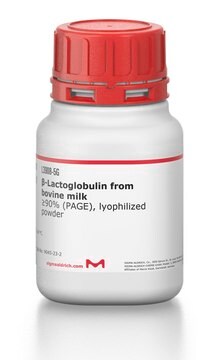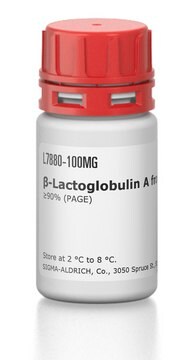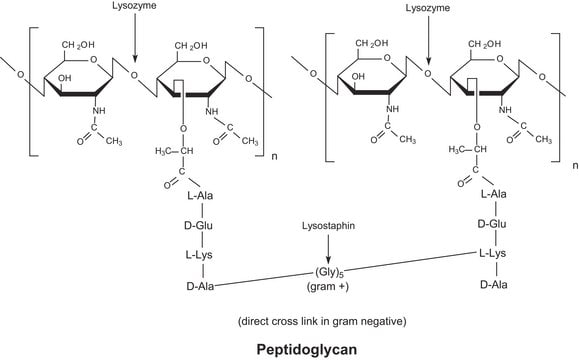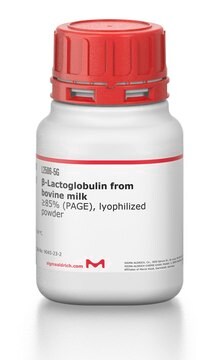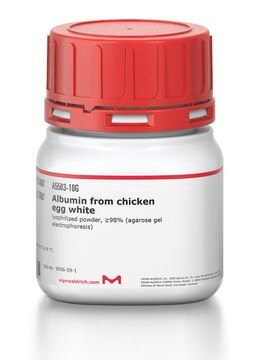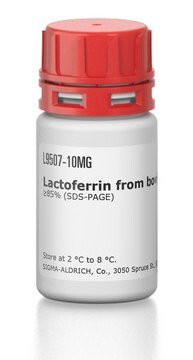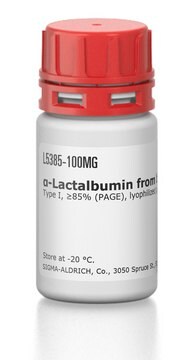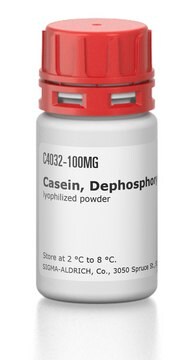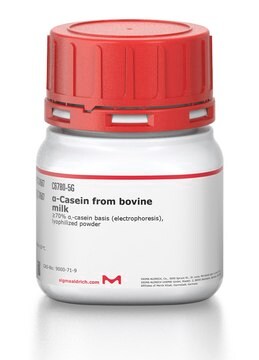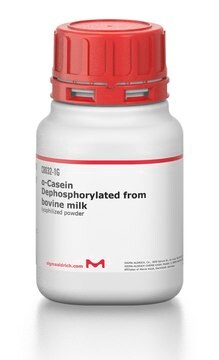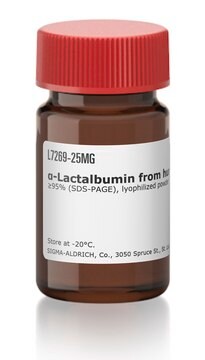L0130
β-Lactoglobulin from bovine milk
≥90% (PAGE), lyophilized powder
Sinônimo(s):
β-LG, Bos d 5, beta-LG
Faça loginpara ver os preços organizacionais e de contrato
About This Item
Produtos recomendados
fonte biológica
bovine milk
Nível de qualidade
Ensaio
≥90% (PAGE)
Formulário
lyophilized powder
nº de adesão UniProt
temperatura de armazenamento
2-8°C
Informações sobre genes
bovine ... LGB(280838)
Procurando produtos similares? Visita Guia de comparação de produtos
Descrição geral
A member of the lipocalin family, β-Lactoglobulin (βLg) is a small protein of 162 amino acids with a molecular mass of ∼18,400 Da. It features an eight-stranded β-barrel (strands A-H) succeeded by a three-turn a-helix and a final β-strand (strand I) that forms part of the dimerization interface.
Milk from dairy cows contains the protein β-lactoglobulin (BLG). It naturally occurs in a number of genetic variants, and the most prevalent bovine variants are BLG A and BLG B.
Aplicação
β-Lactoglobulin from bovine milk was used to test the allergen-responsive CD4+ CD25+ regulatory T cells in children who have outgrown cow′s milk allergy. It is also used to test the competitive displacement of β-lactoglobulin by Tween 20 from oil-water and air-water interfaces.
Outras notas
Contains β-lactoglobulins A and B which can be isolated chromatographically.
Qualidade
May not contain folate binding protein; not recommended for folate analysis.
Nota de preparo
Crystallized
Código de classe de armazenamento
11 - Combustible Solids
Classe de risco de água (WGK)
WGK 3
Ponto de fulgor (°F)
Not applicable
Ponto de fulgor (°C)
Not applicable
Equipamento de proteção individual
Eyeshields, Gloves, type N95 (US)
Escolha uma das versões mais recentes:
Já possui este produto?
Encontre a documentação dos produtos que você adquiriu recentemente na biblioteca de documentos.
Os clientes também visualizaram
Janire Orcajo et al.
Analytica chimica acta, 1052, 163-169 (2019-01-28)
Immunochemical detection of food allergens is usually based on the use of polyclonal or monoclonal immunoglobulins G (IgG) antibodies. However, due to differences in epitopes recognition between IgG and IgE, an epitope modification during food processing can potentially alter allergenicity
The Competitive Displacement of ?-Lactoglobulin by Tween 20 from Oil-Water and Air-Water Interfaces
Peter J. Wilde, David C. Clark
Journal of Colloid and Interface Science, 155, 48-54 (1993)
Unni Haddeland et al.
Pediatric allergy and immunology : official publication of the European Society of Pediatric Allergy and Immunology, 16(2), 104-112 (2005-03-25)
The hygiene hypothesis implies that the increasing prevalence of allergy in 'westernized' countries is explained by reduced bacterial exposure in early life, but the underlying mechanism remains elusive. We therefore wanted to study the effect of bacterial lipopolysaccharide (LPS) on
A Heinzmann et al.
International archives of allergy and immunology, 120(4), 280-286 (2000-01-21)
beta-Lactoglobulin (BLG) represents one of the major allergens causing cow's milk allergy (CMA) - a disease with a wide spectrum of clinical symptoms. The aim of this study was to evaluate sequential B cell epitopes of BLG by the Pin-ELISA
Kristin R Domike et al.
International journal of biological macromolecules, 44(4), 301-310 (2009-05-14)
Proteins aggregated into spherulite structures of amyloid fibrils have been observed in patients with certain brain diseases such as Alzheimer's and Parkinson's. The conditions under which these protein spherulites form and grow are not currently known. In order to illuminate
Nossa equipe de cientistas tem experiência em todas as áreas de pesquisa, incluindo Life Sciences, ciência de materiais, síntese química, cromatografia, química analítica e muitas outras.
Entre em contato com a assistência técnica